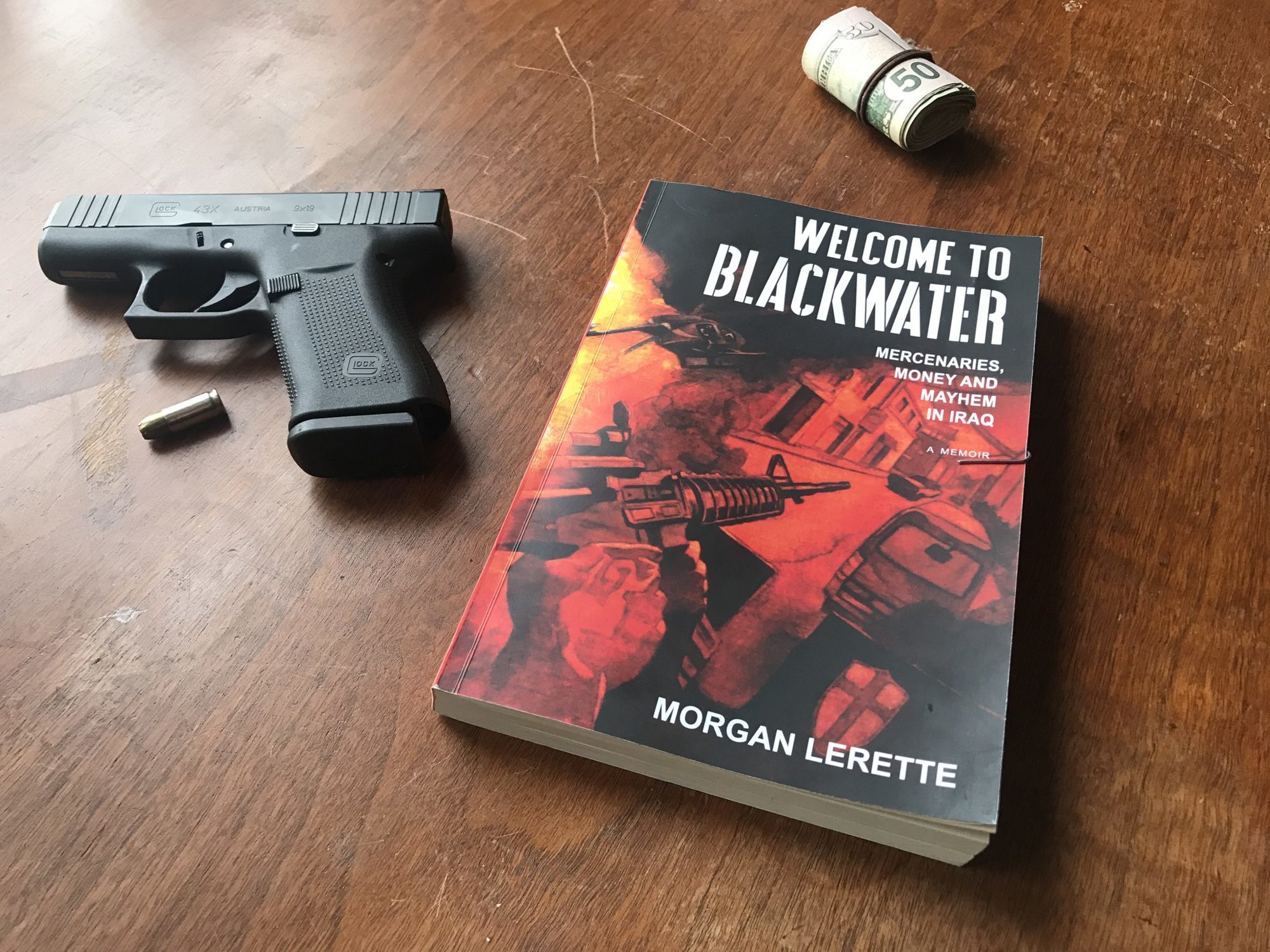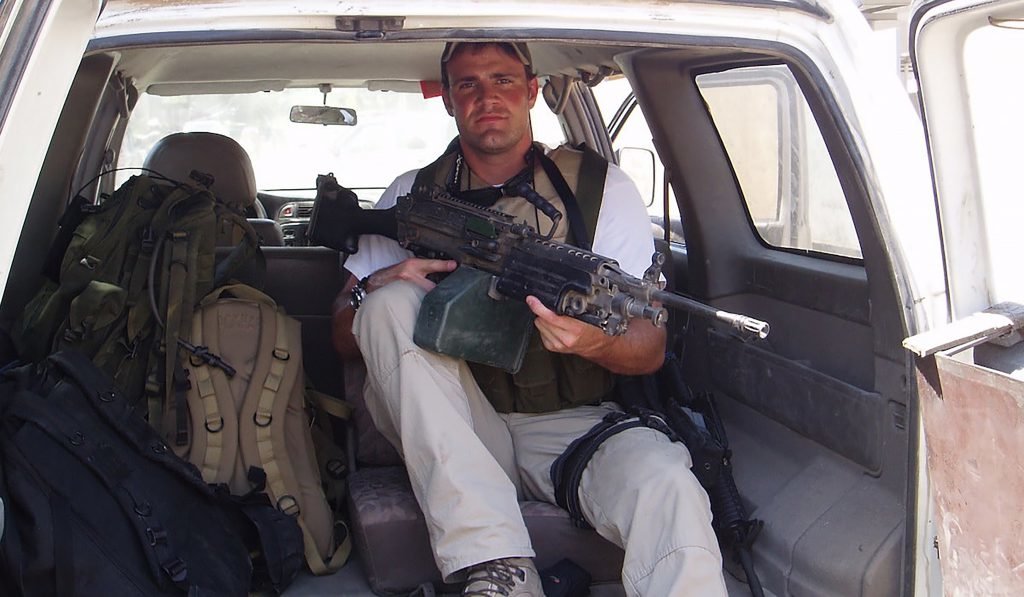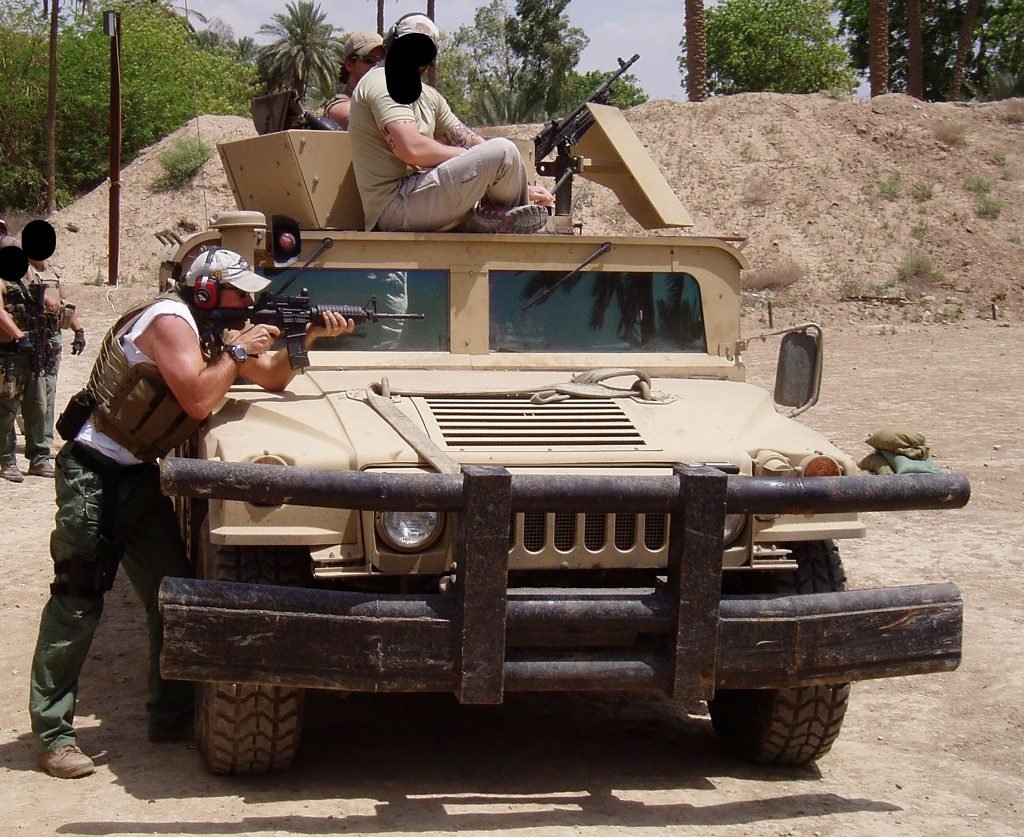Review: ‘Welcome to Blackwater’ Is a Wild Ride About Contracting in Iraq

Photo by Mac Caltrider/Coffee or Die Magazine.
If you’re on the hunt for a true adventure story, look no further. Welcome to Blackwater: Mercenaries, Money and Mayhem in Iraq by Morgan Lerette is a wild ride about contracting with the most notorious private security company to ever hit the war-torn streets of Iraq. Lerette, a “lazy Air Force dude with no cool-guy training,” began working for Blackwater in 2004, at the height of the conflict’s turmoil. With zero regard for political correctness or reader sensitivities, he describes the absurdity of fighting — and more often partying — as a private employee. This glimpse into the rock ’n’ roll lifestyle of American contractors is as entertaining as it is eye opening.
Lerette went to Iraq for money and adventure, receiving healthy — or maybe unhealthy — portions of both. Many people are still confused as to why security professionals, sometimes affectionately referred to as mercenaries, were in Iraq in the first place. Lerette explains the niche role of contractors bluntly: “The U.S. military invaded Iraq to free the shit out of people. With combat operations officially ‘ending’ in June (of 2004), Iraq was now a sovereign nation. This caused the U.S. to shift Iraq from a Department of Defense operation to a Department of State action.”
With such a large undertaking falling under the responsibility of the Department of State, America hired a private army to help with the heavy lifting. Lerette is self-aware of the muddy waters privatized guns created, and he tackles the taboo topic with candid humor.

Technically a war memoir, Welcome to Blackwater has more raunchy tales than trigger-pulling action. His story begins with a brief reflection upon his upbringing, revealing a sad yet funny failed relationship with his father. Once when taking his girlfriend to meet the family, Lerette confused Billy Joel for Elton John and got into a disagreement with his dad over Billy Joel’s sexuality. The disagreement came to a head when Lerette’s dad took offense to the idea of his favorite singer being gay and punched him in the jaw, screaming, “Don’t you ever talk about Billy Joel like that!” Lerette’s path of misunderstandings only further deteriorates from there.
Upon his arrival in Iraq, Lerette does not immediately begin sowing stories of heroism under fire as one might expect; rather, he describes a hysterical encounter with some questionable chicken curry and the resulting bout of debilitating diarrhea.
“It’s my third night in Baghdad. There’s a rumbly in my tumbly, and I’m blasting mud out my ass so violently I contemplate suicide,” he writes. “I realize why the bathroom smells so bad. The Baghdad Bug has ravaged many souls (and jejunums) in this enclosed space.”
Once his bowels have been barricaded, he naturally flows into a story about a horrendous case of athlete’s foot that culminates with him heeding the advice of the team’s medic and urinating on himself as a last-resort remedy for the fungal infection. The nightly, state-funded, alcohol-fueled pool parties provide a consistent backdrop for Lerette’s wholly unique war story. The seemingly endless stream of hookers, beer, and debauchery mixes well with his tales of waging America’s private war.
While the book reads like a combat version of I Hope They Serve Beer in Hell, Lerette has an undeniable talent for storytelling. Reminiscent of Ernest Hemingway‘s famous “terse and objective writing style,” Lerette’s word choices and short sentence structure are deliberate and straightforward and go right for the throat. His approachable style makes for an entertaining read.

For example, while volumes have been written on America’s complicated strategy, or lack thereof, in Iraq, Lerette boils down the conflicting role of private security contractors into a few concise sentences: “Our presence is something of a paradox. Diplomats build the country and we’re here to keep them alive. They win hearts and minds. We protect them at any cost. We protect people who help Iraq, but in doing so, we piss off every Iraqi. Oh well. Maybe in the next war the hawks in D.C. will have a better plan than ‘we promise you’ll be happy we liberated you.'”
Although the book is a memoir of Lerette’s misadventures, Welcome to Blackwater is not a one-man show; the book is brimming with a cast of hilarious characters. Take for example, George, who goes to Harvard simply out of spite, or Jason, aka The Porn King, whose extensive collection of bootlegged explicit DVDs only adds to the filthy ambiance of cigarette smoke and unwashed linen in his tiny room. There’s Oriental Dave, the son of a ROK Marine, who stands in as Lerette’s cultural guide only because he did not confuse the ink covering the fingers of Iraqi voters for feces. Each colorful character has a military background, and in Lerette’s beautifully succinct style, the book settles the age-old debate of which branch produces better warfighters.
“For many of these guys, their military success is due to their intelligence and work ethic. The smartest are Army Special Forces. Navy SEALs are highly trained but arrogant. Rangers and Marines are great at taking orders and executing the job. All are lethal but with differing egos.”
While veterans and active-duty troops of all branches grace the pages, the book never strays too far from its focus on privatized military muscle: an entirely different monster. Lerette reveals a staggering lack of government control. He explains, “The State Department has no way of tracking what we do. No rules. No oversight. It’s intoxicating for a twenty-four-year-old. Young men with huge salaries in a confined space with no adult supervision is a great combination.”

This “great combination” leads to 18 months of questionable actions with virtually no repercussions. Contractors were often “fired,” either due to unfounded complaints from government officials or for more serious scenarios. While it did not take much to technically be fired, the reality more closely resembled being moved around.
The shuffling of contractors under the guise of different contracts mirrored the way the Roman Catholic Church removed criminal priests only to have them suspiciously reappear in new locations. Lerette suffered this same slap on the wrist after drinking to the point of blacking out and destroying an embassy’s bathroom. After being “fired,” his teammates suggested he simply leave his gear in a locker for his inevitable return under a new contract.
In another instance, he was forced to relinquish a leadership billet when his first name was recognized, raising concerns about his having previously been fired. Mistakes were made in the exotic world of contracting during the height of the war in Iraq, and any consequences were sidestepped by a mere rearranging of personnel. Lerette explains how contractors sought to keep unwanted attention off of their backs; it was simply easier not to report any shots fired rather than launch investigations every time a contractor fired his weapon.
By keeping everything in-house, Blackwater was virtually free to operate how they saw fit. These “big-boy rules” proved effective in many ways but left gaping holes for hearts and minds to be lost. This book does not seek to answer whether the lack of oversight was the right or wrong way to accomplish the mission, but rather exposes the somber realities of contracting through a lens of humor. Lerette leaves all judgments up to the reader.
Despite the debauchery and the contractor’s apparent lack of morals on the book’s surface, it is impossible to ignore Lerette’s humanity when it peeks through the mayhem. His outward disdain for the populace he is surrounded by fails to hide his compassion. Following a car accident that kills a child, Lerette writes, “We all joke about death. We know there’s a chance none of us makes it home unless we’re in a shiny metal coffin. We don’t take it personally. This is an exception. This death is personal. I don’t want to think about it. I refuse to talk about it.”
The loss of innocent life impacted him permanently. Beneath the gallows humor that pervades is a story about camaraderie, brotherhood, and a quest for adventure. Welcome to Blackwater: Mercenaries, Money and Mayhem is a thrilling story that will leave you in stitches and also have you scratching your head, wondering what the hell happened in Iraq.
Welcome to Blackwater: Mercenaries, Money and Mayhem in Iraq by Morgan Lerette, United States Veterans Artists Alliance/Onward Press, 264 pages, $30

Mac Caltrider is a senior staff writer for Coffee or Die Magazine. He served in the US Marine Corps and is a former police officer. Caltrider earned his bachelor’s degree in history and now reads anything he can get his hands on. He is also the creator of Pipes & Pages, a site intended to increase readership among enlisted troops. Caltrider spends most of his time reading, writing, and waging a one-man war against premature hair loss.
BRCC and Bad Moon Print Press team up for an exclusive, limited-edition T-shirt design!
BRCC partners with Team Room Design for an exclusive T-shirt release!
Thirty Seconds Out has partnered with BRCC for an exclusive shirt design invoking the God of Winter.
Lucas O'Hara of Grizzly Forge has teamed up with BRCC for a badass, exclusive Shirt Club T-shirt design featuring his most popular knife and tiomahawk.
Coffee or Die sits down with one of the graphic designers behind Black Rifle Coffee's signature look and vibe.
Biden will award the Medal of Honor to a Vietnam War Army helicopter pilot who risked his life to save a reconnaissance team from almost certain death.
Ever wonder how much Jack Mandaville would f*ck sh*t up if he went back in time? The American Revolution didn't even see him coming.
A nearly 200-year-old West Point time capsule that at first appeared to yield little more than dust contains hidden treasure, the US Military Academy said.












